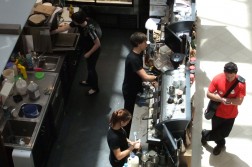If there’s one issue that divides privileged westerners with no real problems to complain about more than any other, it’s Twitter. While some see it as a useful and fun way to connect with people from around the world, stay in touch with friends, and keep abreast of breaking news, others are over 100 years old and live in a cave.
But love it or loathe it, Twitter is here to stay. Statistics show that over 98 per cent of the world’s population now spends an average of 14 hours a day on Twitter, most of which is spent inserting sexual terms into movie titles and trying to get Stephen Fry to notice them. Twitter, created just a few years ago by a group of savvy computer geniuses with a simple dream: to create a website that doesn’t make any money.
For those of us who are incredibly influential media players (i.e. not you), Twitter represents an enormous opportunity to reach out and interact with the public by asking them what to eat for lunch, but it also represents real dangers. We’ve all seen the consequences in recent times of intemperate and careless Twitter usage. Jobs can be lost. Sponsors can evaporate. Milo can be dragged into unpleasant conversations through no fault of its own.
Consider the example of NSW Opposition Leader Barry O’Farrell, who, during the federal election, through no fault of his own, inadvertently publicly expressed an opinion; and more recently got into more hot water when, because of his "fat fingers", he accidentally created the impression he wasn’t homophobic. So we see the catastrophic consequences of careless tweeting.
Luckily, you as readers have access to a writer who is not only perspicacious, witty, and sort of handsome in an unconventional, slovenly kind of way, but is also an established Twitter expert. I don’t think it would be going too far to describe myself as the Mozart of Twitter; in fact it’d be kind of an understatement. In the world of Twitter I am a king — an obsessive-compulsive, over-sharing, MasterChef-fixated king — and I rule benevolently yet with an iron fist. And so I here present my Fool-Proof Guide To Not Being A Complete Arse On Twitter.
1. Do not be anonymous. You might think, oh, I’ll be an anonymous tweeter, and nobody will know who I am and I can say whatever I want about the prime minister and Daryl Somers and what I’d like to do to Justin Bieber in my garden shed. But you’re just asking for trouble. Sooner or later, you’ll make a fatal mistake, tweet a revealing detail, accidentally say something like, "Whoa, tough day, never knew it would be this hard being Treasury Secretary LOL", and your cover’s blown and those tweets about your pregnant goldfish fetish are all over The Australian within minutes. Just be upfront about who you are; people will respect your honesty and forgive you if in moments of passion you use the c-word to refer to certain archbishops.
2. Remember that the world is watching. It is very easy, when your BFF tweets to you, "Yo dickhead, whatcha doin’ tonight?" to forget yourself and reply impulsively, "Your fat mum, wankface!" These are the impulses it is important to avoid: particularly if you are a public figure like me or the Dalai Lama. Because when it’s on Twitter, everyone can see it. Your boss, your minister, your fat mum: everyone. And if someone "RTs" it, it’s only going to get worse. It could go viral. Before you know it, Mia Freedman’s linking to you, you’ve become a meme, and you’re fielding offers for a sitcom called "The New Adventures of Wankface and His Fat Mum". Conduct yourself with a bit more dignity — you’re in public here.
3. Interact. Remember the term is "social media". Social media. Not "blurting out a stream of declarative statements then buggering off media". Not "compiling a comprehensive catalogue of websites I’ve seen with funny pictures of monkeys media". Not "doing nothing but quoting more interesting people than me media". Social. So when people tweet to you, for Christ’s sake tweet back! Don’t worry, it’s natural to be shy. It can be daunting the first time you have a complete stranger say to you, "OMG I love that ep too so many lulz #NPH FTW!" — it can be daunting just to figure out what the hell they’re talking about. But if you want to make your name as a player in the Twittersphere, you have to engage with all the semi-literate degenerates sharing the space with you. So when you get replies to your tweets, tweet back in a friendly and respectful fashion. "Thank you!" you might say, or "Yeah, I was totes exhausted FML", or "I don’t really know, I never saw Deuce Bigalow". I mean, tailor your responses to the circumstances, obviously.
4. Don’t take the bait. There will be times, of course, when Twitter will get nasty. Somebody will object to your taste in music, or your opinions on Israel, or your face. It is important you rise above the fray here. If you plan on becoming a beloved celebrity or statesperson, it is imperative that at no point in the future will your critics or tall-poppy-cutters be able to dredge up any public statements you have made which include the words "you can suck on my fat" or variants thereof.
5. Check your tweets. Make sure you never hit "send" without asking a few basic questions. Like, have I made my meaning clear? Have I defamed anyone? Have I included appropriate emoticons? Have I addressed it to the correct person and not accidentally told Wil Anderson I like his new bra? Be sure your tweet is everything you want it to be. And make sure you’re sending the right thing. As O’Farrell found out, there’s a big difference between a DM and a public tweet, and if you’re not lucky enough to have chosen a career path as easy and non-taxing as NSW Opposition Leader, it could be the difference between success and failure. And on a related note…
6. Spell correctly. I can’t stress this enough. SPELL PROPERLY. Imagine those two words punching you in the face over and over again: that’s how emphatic I want to be. I mean, of course, you COULD just go on spelling badly, flaunting your ignorance of basic English, carrying on in a cavalier fashion like some wanton language-whore, like all those OTHER people on Twitter who seem to constantly be popping up in front of me; but is that the kind of Twitterer you really want to be? REALLY? What are the consequences of bad spelling on Twitter? Well, none, really. You’ll probably get away with it. It’s just that I will hate you and you will be, deep deep down inside, a bad person. So you know, up to you really.
7. Careful what you link to. Again, a lesson O’Farrell learned the hard way. It’s a subtle art, selecting the right links to put up, but there are a few basic rules of thumb. For example, videos of kittens = good. Videos of genital torture = bad. Articles about the decline in the quality of mainstream journalism = good. Articles about the decline in white pride in the broader community = bad. Old Spice = good. Miranda Devine = bad. Etcetera. Trust your instincts. Unless you’re an idiot. Then don’t.
8. Know how to use hashtags. A hashtag can be a beautiful way to express solidarity, share a sense of community, or add a clever punchline to your tweets. But they must be used wisely, and with a sense of proportion. Don’t go overboard. #freetibet is a good hashtag, as is #BettyWhiteDay, or #puttingknobinsonglyrics. Simple, pithy, quick. What is NOT a good a hashtag is #stuffIthoughtImightdolatertodaybutthendecidednottobecausereallyIamnotinthemoodeversinceRyanyelledatmejustbecausehehadabaddayatthejuicestand. Do you see? The hashtag is the icing, not the cake. Also, don’t be a serial hasher. One hashtag in a tweet is fine; two is OK in moderation. But nobody will be your friend if you go around saying stuff like "#soanyway #goodmorning #everyone #whatsup #Ithink #Iwillhave #pizzafor #lunch". It’s just annoying. And really, on Twitter you want to disguise your annoying nature as much as possible.
9. Cultivate valuable relationships. Famous people are on Twitter a lot, e.g. me, and Rhys Muldoon. These are the people you want to get to know, get them to follow you, hopefully even squeeze a #FF from them. Tweet replies to them as much as possible. Preferably about how great they are. That’s what we like. It’s OK to crack jokes to them, but don’t be too funny — nobody likes to be outshone, after all. The important thing is you make yourself visible to celebrities. Because the greatest use of Twitter is as a vehicle for the manifestation of reflected glory. By associating yourself with famous people, you will yourself become famous. I myself owe pretty much my entire career to my carefully calculated pursuit of Tara Moss. So get stalking! And finally…
10. Do not be yourself. Yourself is who you are in real life, and look how badly that’s turning out for you. Twitter is your chance to build a better personality for yourself. Acting naturally is a sure recipe for a single-digit follower list and an @ reply page full of tumbleweeds. Take a good look at yourself, and make the effort to be smarter, funnier, and more interesting. Get out there and be the best manufactured fake-you you can be!
So there you go. Ten fundamental ground rules for conducting a Twitter-life that is happy, fulfilling, and financially lucrative. Just remember: you have been born into the first era in history where a person can become famous and respected simply for transmitting a constant stream of the disposably banal half-thoughts that float through their web-atrophied brains. It’s a golden age — don’t waste it!
Happy Tweeting!
If you liked this article help keep New Matilda alive by pledging your support.
Donate To New Matilda
New Matilda is a small, independent media outlet. We survive through reader contributions, and never losing a lawsuit. If you got something from this article, giving something back helps us to continue speaking truth to power. Every little bit counts.



